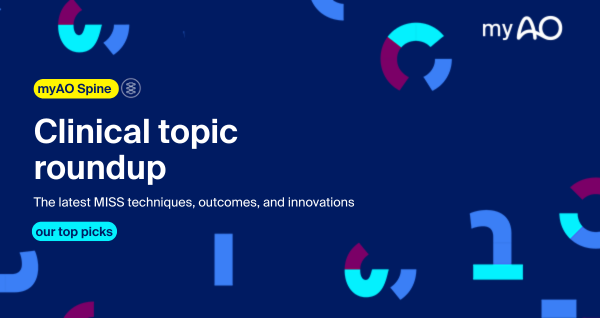Clinical Topic Roundup
February 2022
Degenerative spinal conditions represent one of the most frequent domains of spinal pathology, which can affect patients of any age. Appropriate management can reduce the morbidity and improve significantly the life quality of these patients. myAO is offering you the following exclusive selection of "knowledge gems" around spinal degeneration.March 2022
Recent developments in imaging technology have allowed for rapid processing and visualization of significant amounts of data yielded from a variety of digital imaging modalities. Prerequisites have been established for three-dimensional (3D) visualization as well as programs for the computer-assisted 3D planning of surgical procedures, and these image sources are now available to assist the surgeon in the operating room.September 2021
How should a clinician tackle the management and treatment of a Periprosthetic Joint Infection (PJI)? An individualized approach must be developed for each patient, one that integrates appropriate surgical intervention and antimicrobial strategies.June 2022
Veterinary joint surgery includes a.o. cranial cruciate ligament surgeries and surgical treatments for a range of joint issues such as elbow dysplasia, hip dysplasia, as well as full knee and hip replacements. In this clinical topic roundup, you´ll find an exclusive selection of AOVET´s knowledge gems on joint surgery.March 2022
Pelvic and acetabular fractures (PAFs) are among the most serious injuries treated by orthopedic surgeons and require rapid and precise treatment. In response, AO Trauma's pelvis education task force is working on the definition of a curriculum to address these challenges.April 2023
Orthognathic surgery comprises a series of technical procedures aimed at the correction of the volume and position of the facial bones. Since the mandible and maxilla are tooth-bearing segments, a combined orthodontic-surgical treatment is required in order to attain an optimal occlusion.May 2022
Surgeons’ demand for knowledge and training on Head & Neck Cancer and Oral Oncology spans the specialties from head and neck surgery to maxillofacial, plastic, ear, nose, and throat, and general surgery. myAO is offering you the following exclusive selection of "knowledge gems" around Head & Neck Cancer and Oral Oncology.September 2021
Navigation technology is a widely available tool in spine surgery, and Computer-assisted Surgery (CAS) and Image-guided Surgery (IGS) have become a part of clinical routine in many centers. It is the aim of this roundup to give an overview on the current knowledge shared on myAO concerning the capabilities of computer-assisted and image-guided approaches.















